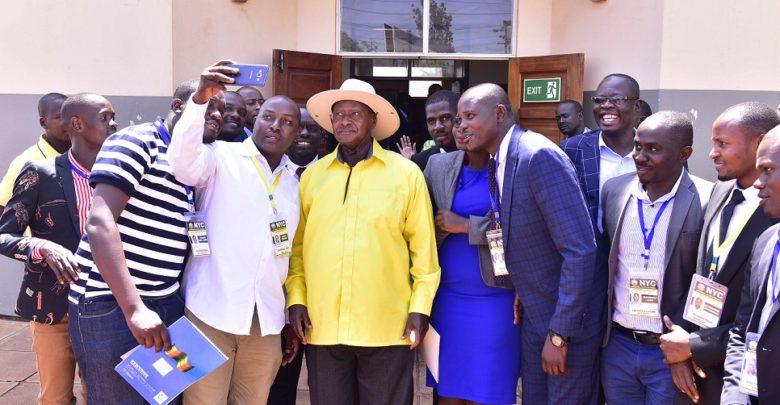Is The NRM Government Neglecting The Youth? Part II

After dealing with the conceptual stages of the foundational policies that singled out Youths among the special interest groups in Uganda, right from the constituency assembly in my part one of these article series, part two is a trace of the Effectiveness of Youth Participation in Policy processes in Uganda.
In the last two decades, the NRM government has reached out to youths through youth structures. Youth involvement and participation in leadership in decision making was firstly guaranteed through the enactment of the National Youth Council statute in 1993 to organize youth into a unified body that could engage with different policy processes. At the national level, there is a provision in the law for five youth Members of Parliament, the National Youth Council, district youth councils, sub-county, and even village youth councils.
More recently though, efforts to revamp youth participation in the policy and development process with the goal to encourage young people to get involved in the policy process are in place, the NRM government has also pursued a generous open space policy that grants development partners, international agencies and civil society organizations become prominent actors in enabling youth involvement in policy processes.
The State also continues to engage youth in policy, although many opposition forces pursue disempowering propaganda as we continue to see Ugandan youth majorly used as fronts for political aspirations of the power enthusiastic elements of the opposition. It is also extremely important to note that a number of youth efforts at participation in the policy process are evident from local government levels to National.
There are also blossoms of effort that represent that NRM government has been home for independent youth organizing and engagement with the policy process regardless of whether it is civil society-led or government institutional spearheaded. A case in point is the Youth Engagement with legislative processes, this is evidenced for example during, The National Youth Enterprise Fund Bill.
In 2008, the Uganda Parliamentary Forum on Youth Affairs (UPFYA) was first initiated in the eighth parliament of Uganda by the youthful legislators at the time, who wanted to make their presence in the house count for more meaningful impact in the lives of their fellow Ugandan youth at the time. The forum has however been more visible in the 9th parliament as Youth members of parliament come out strongly to push for legislative reforms to address the plight of the youth they represent in the house.
On 14th May 2012, Uganda Parliamentary Forum on Youth Affairs (UPFYA) convened a National consultative dialogue where youth leaders in their diversity convened to deliberate on the Youth Enterprise Fund Bill. Over 160 participants were drawn from 90 districts and comprised of district youth leaders, youth in civil society, development partners, members of parliament and representatives from the line ministry for youth, Ministry of Gender, labour and Social Development. The patron of the forum, the Rt. Hon. Speaker of the 9th Parliament, Rebecca Kadaga Alitwala was also part of these deliberations. The participants in the meeting unanimously agreed that the Youth MPs should advance the proposal to create the Youth Enterprise Fund and draft a Bill to be tabled on the floor of parliament.
Subsequent regional level meetings were held, including a content building meeting to review the final draft of the Youth Enterprise Fund proposal. This birthed, the Motion for the Bill being successfully tabled in parliament on 4th April 2012. The National Youth Enterprise Fund Bill was a private members Bill sponsored by Hons. Monica Amoding (also chairperson of the PFYA), Gerald Karuhanga, Peter Ogwang, Acire, Nakabaale and Anite Evelyn. Its objectives included among other things; the establishment of a center to ease access to information for young people on different initiatives including income generation, business management, and business proposal development.
Further, the process was inclusive as efforts were made to seek input from different stakeholders in the youth fraternity.
Another area in which Youth ably participated is in the National Development Plan and Vision 2040. Uganda’s Poverty Eradication Action Plan underwent review in 2009 and was replaced by the National Development Plan to guide development priorities for the country. The NRM government together with development partners supported a number of youth organizations to engage with the highly technical National Development Plan process. The logic for supporting Youth was that they represent a demographic majority and their involvement would count for more inclusiveness in the NDP process.
More so, government in partnership with development partners, supported a National Youth Consultation in June 2009 that brought together a total of 52 young people, each representing a district. Their input was listened to and is clearly documented and incorporated into the final version of the National Development Plan.
In 2013, the National Development Plan was further upgraded to VISION 2040 and a similar process of developing an upgraded document was undertaken. The only difference was that in the consultation for vision 2040, the Youth were consulted in the validation process not from the onset as was the case with the NDP.
The National Planning Authority (NPA) convened youth leaders’ consultative meeting where they met youth leaders from civil society organizations and youth councils on 18th March 2013. This time around, the submissions and feedback that the youth made into the process included concerns that the Vision was very exclusionary, focusing on meeting the development needs of a minority as opposed to the majority who are largely young people. The youth also raised concerns around the corruption trends in the country and how it could compromise the attainment of vision 2040. Like the NDP process, the views were also taken into consideration by the NPA officials who were present.
These and many more other government-led processes have seen the youth play a pivotal role in the formulation, and implementation of policies.
It therefore becomes a canard for any assertion that the youths have been neglected by the NRM government.



Comments are closed.